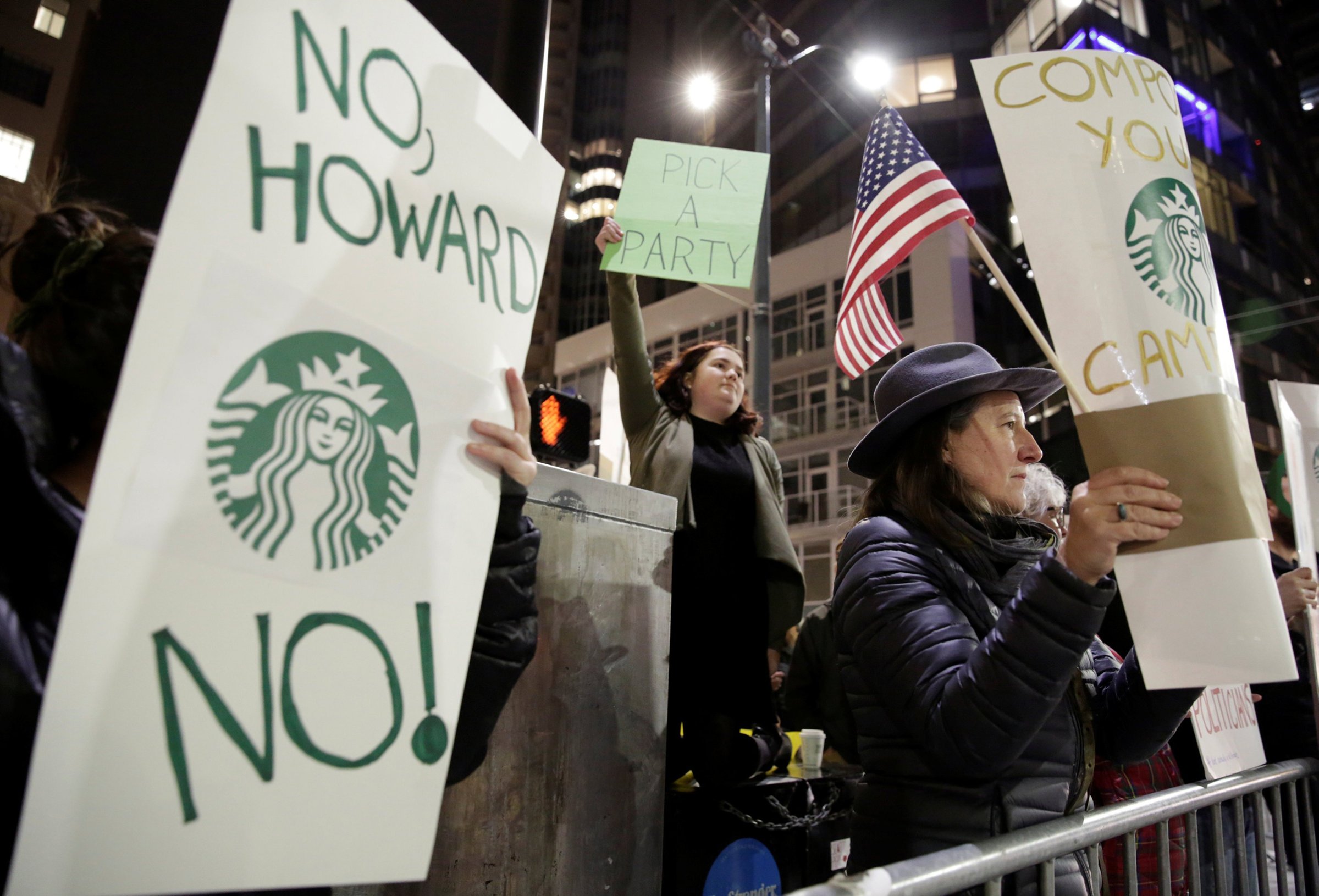
By even just testing the waters for an independent presidential run in 2020, billionaire former Starbucks CEO Howard Schultz has done us a favor. He has revealed the political bigotry inherent in the torrent of “spoiler” charges immediately leveled at him by Democratic Party partisans and scores of pundits — including supposed champions of the free-speech rights of very unpopular opinions — who claim he will swing the 2020 election to President Trump. Never mind Schultz’s right to free speech, petition and assembly.
In my presidential campaigns, all the media wanted was my reaction to the spoiler charge. It didn’t matter that I worked on overdue reforms mostly supported by a majority of the public. It didn’t matter that these initiatives had been taken off the table by the two major parties. The label will surely plague Schultz too — even after he clarified on Feb. 4, “I promise I would do nothing whatsoever to be a spoiler to re-elect Donald Trump.”
But the term has also been a distraction from a deeper strategic issue: Schultz’s inclination to run as an independent candidate.
Calling himself a “lifelong Democrat,” the coffee magnate advances views that he dubiously calls “centrist” but that decidedly reflect his plutocratic class. His business practices were anti-labor. He is anti-higher-taxes-on-the-wealthy, anti-Medicare-for-all, anti-tuition-free-higher-education, anti-government-employer-of-last-resort and anti-Social-Security-protection. He calls these measures “extreme,” “unaffordable” and even “not American.”
He frets deeply about growing federal deficits without distinguishing those that come from corporate welfare (which Starbucks has received) and the massive Trump tax cuts (which Schultz has denounced) — in contrast to deficits from infrastructure capital investments that generate GDP growth and efficiencies.
He praises Ronald Reagan and calls Trump “unqualified.” Yes, he wants to stay in the Paris climate accord. And he has a more open stance on immigration than Trump. But moderate Republican voters share those views as well.
Howard Schultz’s agenda is simply far closer to the GOP’s agenda. He would be better off registering as a Republican and challenging President Trump inside the party primaries, where he would receive massive visibility.
Currently, Schultz is testing his dream theory that many people in the Republican and Democratic parties bridle at their parties’ polar extremes. Enough such voters can, in Schultz’s view, be joined with truly up-for-grabs independent voters to give him the edge in a three-way race. He will soon be disabused.
Independent candidate Ross Perot received more than 19 million votes in 1992 and briefly led the polls in that three-way race. He received not one Electoral College vote. It is very doubtful that the less evocative Schultz will come close to Perot’s total, disadvantaged as he will be by the same winner-take-all system and even higher hurdles to get in the two-party-controlled presidential debates. (Perot managed to overcome the latter.)
In no other Western democracy is it remotely as difficult for candidates to get on the ballot and give more choices and voices to the voters. Third-party suppression is an American specialty — one I’ve experienced firsthand.
What is tragic is that this creates a pattern: since independent or third-party candidates do not have a chance to win, the media don’t give them the coverage needed to compete and grow — even when they actually represent a majority of Americans’ beliefs. It is a vicious cycle.
It once was easier to get on the ballot. A series of pioneering parties started in 1840 with the Liberty Party, which demanded the abolition of slavery. Later, the Populist, Progressive and other parties pressed for women’s suffrage, labor rights, regulation of Big Business, progressive taxation, the 40-hour workweek, health insurance, social security and electoral reforms. Not a single one won a national election, but their voters led the way on policies that the major parties eventually adopted.
Schultz is no revolutionary. Oppose or support him as you wish. But do not demand he stay out or drop out and still call yourself a small-D democrat. Ultimately, it’s the voters’ fundamental right to choose.
Nader, a consumer advocate, ran for President four times and is the author of How the Rats Re-Formed the Congress
More Must-Reads from TIME
- Cybersecurity Experts Are Sounding the Alarm on DOGE
- Meet the 2025 Women of the Year
- The Harsh Truth About Disability Inclusion
- Why Do More Young Adults Have Cancer?
- Colman Domingo Leads With Radical Love
- How to Get Better at Doing Things Alone
- Michelle Zauner Stares Down the Darkness
Contact us at letters@time.com